Arab Spring
Ten Years After the Arab Spring: The Arab World’s Dictators Are On Notice
 Charles Kurzman, “The Arab World’s dictators are on notice – they know that their populations desire and demand government of decency,” Reaction, December 17, 2020. On the morning of December 17, 2010, La Presse de Tunisie led with a story about President Zine El Abidine Ben Ali’s meeting with the foreign minister of Qatar. The newspaper could not have known that a young man in central Tunisia would set himself on fire in protest later that day, or that mass protests would follow, sweeping Ben Ali and his coterie from power less than a month later, after twenty-three years of dictatorial rule. More…
Charles Kurzman, “The Arab World’s dictators are on notice – they know that their populations desire and demand government of decency,” Reaction, December 17, 2020. On the morning of December 17, 2010, La Presse de Tunisie led with a story about President Zine El Abidine Ben Ali’s meeting with the foreign minister of Qatar. The newspaper could not have known that a young man in central Tunisia would set himself on fire in protest later that day, or that mass protests would follow, sweeping Ben Ali and his coterie from power less than a month later, after twenty-three years of dictatorial rule. More…
Unruly Protest
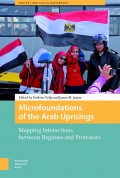 Charles Kurzman, “Unruly Protest,” in in Frédéric Volpi and James M. Jasper, editors, Microfoundations of the Arab Uprisings (Amsterdam, Netherlands: Amsterdam University Press, 2018), pp. 183-191. “Near the shore of the Khaleej, outside a conference hall, I lingered after dinner with a group of Arab professionals. They had come from across the region, some for the week and some for good. They read multiple daily newspapers and could lecture confidently on political economy and modern Arab history. Naturally, conversation turned to the so-called Arab Spring. … As debate ran into the night, I began to see a consensus, notwithstanding their theoretical differences: the uprisings of the Arab Spring were both inevitable and doomed. They had to happen, and they had to fail.” More…
Charles Kurzman, “Unruly Protest,” in in Frédéric Volpi and James M. Jasper, editors, Microfoundations of the Arab Uprisings (Amsterdam, Netherlands: Amsterdam University Press, 2018), pp. 183-191. “Near the shore of the Khaleej, outside a conference hall, I lingered after dinner with a group of Arab professionals. They had come from across the region, some for the week and some for good. They read multiple daily newspapers and could lecture confidently on political economy and modern Arab history. Naturally, conversation turned to the so-called Arab Spring. … As debate ran into the night, I began to see a consensus, notwithstanding their theoretical differences: the uprisings of the Arab Spring were both inevitable and doomed. They had to happen, and they had to fail.” More…
Syria’s Four Revolutions
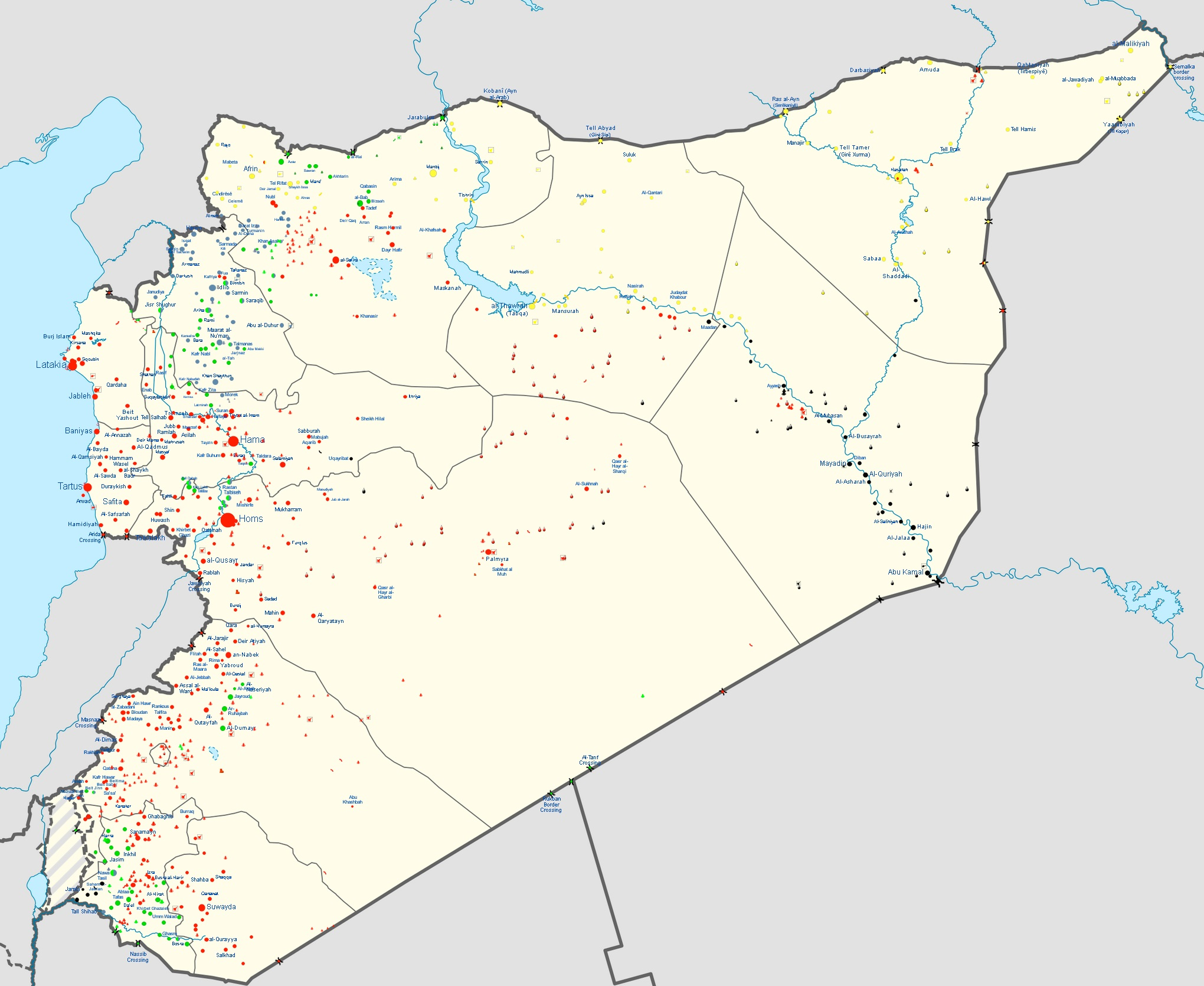 Charles Kurzman, “Syria’s Four Revolutions,” August 31, 2017. Revolutionary upheaval is not uncommon, but it is rare for a country to experience more than one revolution at a time, and almost unprecedented to have four revolutions going at once. That’s what Syria is going through — four distinct revolutionary movements and a brutal government have shattered Syria into bloody shards, with hundreds of thousands of fatalities, millions of refugees, and millions more displaced and suffering. More…
Charles Kurzman, “Syria’s Four Revolutions,” August 31, 2017. Revolutionary upheaval is not uncommon, but it is rare for a country to experience more than one revolution at a time, and almost unprecedented to have four revolutions going at once. That’s what Syria is going through — four distinct revolutionary movements and a brutal government have shattered Syria into bloody shards, with hundreds of thousands of fatalities, millions of refugees, and millions more displaced and suffering. More…
Was the Arab Spring Worth It?
![]() Charles Kurzman, “Was the Arab Spring Worth It?” Mobilizing Ideas, March 1, 2017. “You risked your life for freedom, dignity, justice, and equality. You took days and weeks from other responsibilities – from your family, your school, your work — in order to serve your nation. You convinced yourself that you were building a better future. Now you ask yourself, was it worth it?” More…
Charles Kurzman, “Was the Arab Spring Worth It?” Mobilizing Ideas, March 1, 2017. “You risked your life for freedom, dignity, justice, and equality. You took days and weeks from other responsibilities – from your family, your school, your work — in order to serve your nation. You convinced yourself that you were building a better future. Now you ask yourself, was it worth it?” More…
The Iranian Revolution and the Arab Uprisings
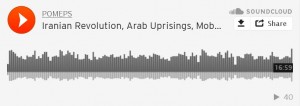 Marc Lynch with Charles Kurzman, “Iranian Revolution, Arab Uprisings, Mobilization,” POMEPS Conversation 71, June 13, 2016. “There’s the sense of disillusionment when things don’t turn out well. The hopes and dreams that come crumbling down when the new institutions turn out not what you thought they ought to be. We saw this in Iran, when a huge portion of the population that was so active in bringing down the shah, then feels that their revolution was hijacked. This new Islamic Republic doesn’t represent what they meant at all. We see it again after the uprisings of the Arab Spring; huge portions of the populations saying, ‘No, no. This isn’t what we wanted.'” More…
Marc Lynch with Charles Kurzman, “Iranian Revolution, Arab Uprisings, Mobilization,” POMEPS Conversation 71, June 13, 2016. “There’s the sense of disillusionment when things don’t turn out well. The hopes and dreams that come crumbling down when the new institutions turn out not what you thought they ought to be. We saw this in Iran, when a huge portion of the population that was so active in bringing down the shah, then feels that their revolution was hijacked. This new Islamic Republic doesn’t represent what they meant at all. We see it again after the uprisings of the Arab Spring; huge portions of the populations saying, ‘No, no. This isn’t what we wanted.'” More…
Waves of Democratization, Waves of Disillusionment
![]() Charles Kurzman, “Waves of Democratization, Waves of Disillusionment: The Arab Spring in Historical Perspective,” Project on Middle East Political Science (POMEPS), June 7, 2016. “Most new democracies fail. They dissolve into civil wars, or are overtaken by coups or collapse under authoritarian bureaucrats and demagogues. They fade into obscure paragraphs in history books. Who remembers the Iranian constitution of 1906 or the Ottoman parliament of 1909, for example? Who remembers the Azerbaijani parliament of 1918 or the Egyptian revolution of 1919 or the Kuwaiti council of 1921? Perhaps the Arab Spring will suffer a similar fate – to be forgotten or dismissed for not having lived up to its hope. More…
Charles Kurzman, “Waves of Democratization, Waves of Disillusionment: The Arab Spring in Historical Perspective,” Project on Middle East Political Science (POMEPS), June 7, 2016. “Most new democracies fail. They dissolve into civil wars, or are overtaken by coups or collapse under authoritarian bureaucrats and demagogues. They fade into obscure paragraphs in history books. Who remembers the Iranian constitution of 1906 or the Ottoman parliament of 1909, for example? Who remembers the Azerbaijani parliament of 1918 or the Egyptian revolution of 1919 or the Kuwaiti council of 1921? Perhaps the Arab Spring will suffer a similar fate – to be forgotten or dismissed for not having lived up to its hope. More…
After the Arab Spring: Do Muslims Vote Islamic Now?
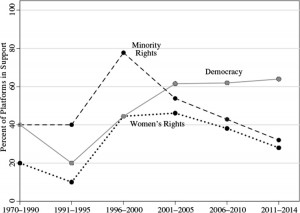 Charles Kurzman and Didem Türkoğlu, “After the Arab Spring: Do Muslims Vote Islamic Now?” Journal of Democracy, Vol. 26, No. 4, October 2015, pp. 100-109. “Do Muslims Vote Islamic?” asked an article by Charles Kurzman and Ijlal Naqvi in the April 2010 issue of the Journal of Democracy. The answer, at that time, appeared to be rarely. This essay presents updated data on Islamic political parties’ performance in parliamentary elections through the end of 2014, along with an expanded set of electoral platforms. Since 2011, the trend toward liberal themes has stalled, but Islamic parties have not fared much better in elections since the Arab Spring than before. More…
Charles Kurzman and Didem Türkoğlu, “After the Arab Spring: Do Muslims Vote Islamic Now?” Journal of Democracy, Vol. 26, No. 4, October 2015, pp. 100-109. “Do Muslims Vote Islamic?” asked an article by Charles Kurzman and Ijlal Naqvi in the April 2010 issue of the Journal of Democracy. The answer, at that time, appeared to be rarely. This essay presents updated data on Islamic political parties’ performance in parliamentary elections through the end of 2014, along with an expanded set of electoral platforms. Since 2011, the trend toward liberal themes has stalled, but Islamic parties have not fared much better in elections since the Arab Spring than before. More…
The dataset constructed for this paper is available here.
Winter Without Spring
 Charles Kurzman, “Winter Without Spring,” Contexts, Spring 2013, pp. 14-15. “From Oman in the east to Morocco in the west, most rulers of the Middle East managed to survive the uprisings of 2011. As fears of mass protest have subsided, these autocrats are re asserting control, imposing an ‘Arab Winter’ on countries that did not experience a full-fledged ‘Arab Spring.'” More…
Charles Kurzman, “Winter Without Spring,” Contexts, Spring 2013, pp. 14-15. “From Oman in the east to Morocco in the west, most rulers of the Middle East managed to survive the uprisings of 2011. As fears of mass protest have subsided, these autocrats are re asserting control, imposing an ‘Arab Winter’ on countries that did not experience a full-fledged ‘Arab Spring.'” More…
The Arab Spring Uncoiled
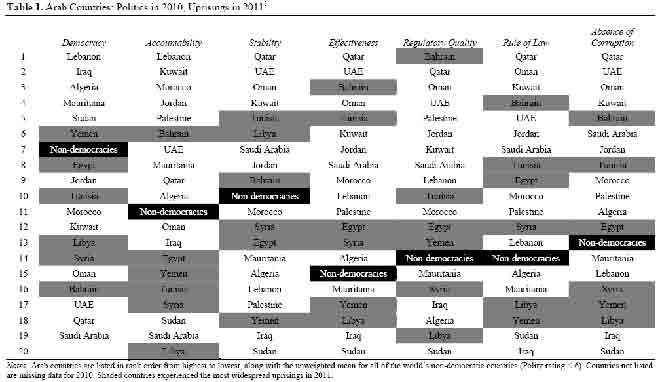 Charles Kurzman, “The Arab Spring Uncoiled,” Mobilization, Vol. 17, No. 4, December 2012, pp. 377-390. “Since the ‘Arab Spring’ emerged in the winter of 2011 … observers have rushed to explain mass revolts in the region. This introduction … reviews some of the explanations offered for these extraordinary events, and finds that the factors that are frequently cited in these explanations do not map comfortably onto the sites of greatest protest in the region. The essay then suggests an alternative approach, one that looks past causation in an attempt to understand the lived experience of the uprisings.” More…
Charles Kurzman, “The Arab Spring Uncoiled,” Mobilization, Vol. 17, No. 4, December 2012, pp. 377-390. “Since the ‘Arab Spring’ emerged in the winter of 2011 … observers have rushed to explain mass revolts in the region. This introduction … reviews some of the explanations offered for these extraordinary events, and finds that the factors that are frequently cited in these explanations do not map comfortably onto the sites of greatest protest in the region. The essay then suggests an alternative approach, one that looks past causation in an attempt to understand the lived experience of the uprisings.” More…
Votes Versus Rights
 Charles Kurzman, “Votes Versus Rights,” Foreign Policy magazine’s “Democracy Lab,” February 10, 2012. “Elections in Egypt, and throughout the Arab Spring, pose a classic dilemma of political theory: Do you support democracy, even if it means sacrificing some civil rights? Or do you support rights, even if it means stifling democracy?” More…
Charles Kurzman, “Votes Versus Rights,” Foreign Policy magazine’s “Democracy Lab,” February 10, 2012. “Elections in Egypt, and throughout the Arab Spring, pose a classic dilemma of political theory: Do you support democracy, even if it means sacrificing some civil rights? Or do you support rights, even if it means stifling democracy?” More…
The Arab Spring: Ideals of the Iranian Green Movement, Methods of the Iranian Revolution
 Charles Kurzman, “The Arab Spring: Ideals of the Iranian Green Movement, Methods of the Iranian Revolution,” International Journal of Middle East Studies, Vol. 44, No. 1, February 2012, pp. 162-165. “Which Iranian uprising does the Arab Spring bring to mind? The Green Movement of 2009, which challenged the pillars of the Islamic Republic of Iran, or the Iranian Revolution of 1979, which brought the Islamic Republic to power? As protests swept Tunisia and other Arab countries, prominent Iranians claimed both of the Iranian precedents as inspiration for the Arab uprisings.” More…
Charles Kurzman, “The Arab Spring: Ideals of the Iranian Green Movement, Methods of the Iranian Revolution,” International Journal of Middle East Studies, Vol. 44, No. 1, February 2012, pp. 162-165. “Which Iranian uprising does the Arab Spring bring to mind? The Green Movement of 2009, which challenged the pillars of the Islamic Republic of Iran, or the Iranian Revolution of 1979, which brought the Islamic Republic to power? As protests swept Tunisia and other Arab countries, prominent Iranians claimed both of the Iranian precedents as inspiration for the Arab uprisings.” More…